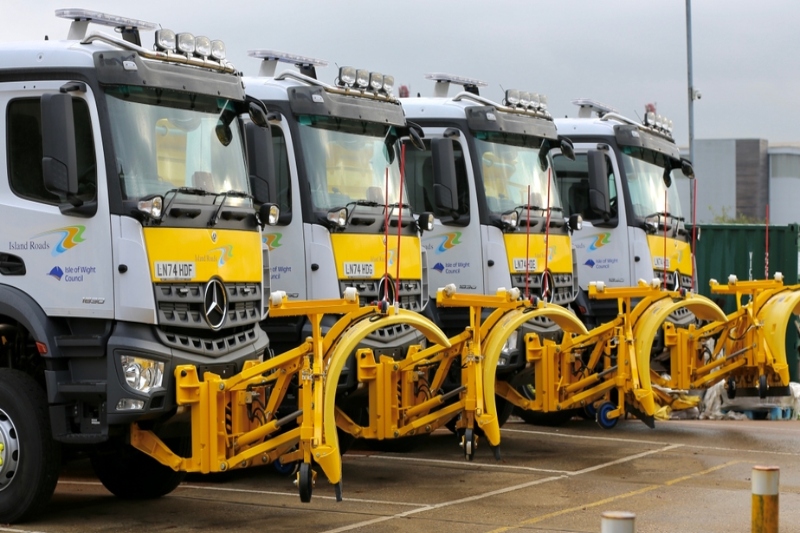Louise Murphy visited several Swedish waste operators to see how they turn their waste into a valuable resource. NTM's Quatro system makes ipossible to recycle a staggering 90% of all materials, with only 10% being sent to the incinerator.This vehicle is now also available in the UK.
NTM's Quatro body, for advanced recycling operations has been in use in Scandinavia for 10 years, and the company is now introducing the system to the UK. Sweden is considered to be at least 10 years ahead of the UK in terms of recycling and waste management. In the Swedish city of Lund, Lunds Renhållningsverk ' Lund Sanitation Works (LSW). LSW is a privately owned waste company, established for over one hundred years, it is responsible for waste management in the municipality of Lund.
LSWs environmental and marketing chief, Anna Wilhelmsson explains that LSW has been operating the Quattro Select system since 2004. “The reason for switching to the current system is that we were not happy with the “box” collection we were offering households. Not only was it unsuitable from a health and safety point of view, with refuse collectors having to lift heavy boxes, we also experienced increasing difficulty in acquiring space for recycling stations.”
Segregated compartments
LSW decided to create its own advanced kerbside recycling system, that directed the responsibility for the volume of waste produced back to the public. The Swedish company PWS Waste Systems (Otto is the UK brand) was assigned to design two 370-Litre bins, divided into four separate compartments, with three wheels enabling easy movement of the bins. Each bin houses four fractions in segregated compartments. Bin one stores household waste; food waste coloured glass and plastics; and bin two contains paper, clear glass paper and metals. The individual sections are of different sizes to fit the recycling products. For instance, compartment one and two are smaller and are designated for coloured glass and hard plastics, as are compartments five and six for metals and clear glass.
Compartments three, four, seven and eight are the largest, designed for paper, packaging, food waste and residual waste.
With the bin design in place, LSW approached several RCV manufacturers to construct a body. NTM was the only company that rose to the challenge as it had a similar product in use, capable of collecting four separate waste fractions and that would empty in only one lift ' 21 seconds.
The first kerbside recycling system was trialled for a year on 150 households in Lund. After this period LSW conducted a survey, which revealed that 97% of participants were very positive and wanted to use the system, 2% said it was dependent on cost, and only 1% said they did not want the system at all.
Although the system is heavily dependent on the household's dedication to recycling, and the placement of the correct materials in the right section of the bin, surveys and past experience have indicated that the public will rise to the challenge and will start taking ownership on how much waste it actually produces.
LCW conducted another study on the purity of waste streams, to find out if the Quatro really did eliminate cross contamination of the waste. The results were incredibly impressive with a remarkable 90% of all waste being recyclable, with 10% of residual waste sent for incineration (at a cost of 680 Krona/£68.00 GBP per tonne) ' which means absolutely none of the waste goes to landfill. Even food waste, reduced by 35% by using the Quatro, is processed and turned into bio-gas to run the refuse vehicles.
Cost implications
Astonishing result ' what were the cost implications of switching to this new system to both LSW and the community? The set up costs are higher. A Quatro vehicle and 200 bin trial would cost around £300K in the UK in comparison to £130K for a single kerbside waste system.
However, it proved a huge success in Lund with one Quatro doing the job of two traditional kerbsiders, so fewer vehicles are required. It can also be operated on a one-man, one-machine basis, accounting for savings on manpower. Also, the Quatro has a 10t payload, in comparison to 2 tonnes for a conventional vehicle. The potential to earn on waste is greater too ' because it produces high quality recyclables ' even though LSW recyclables are sold back to the producers at vastly reduced rates, because of Swedish legislation.
If LSW sold its recyclables on the open market it would make five times more revenue. As a consequence of the introduction of the Quatro system the number of MRFs (Materials Recycling Facilities) in the region has been reduced from 35 to 24. Obviously, the MRFs are not keen on the Quatro system as it means they no longer have control of the waste, and receive less recyclables, because LSW sells these directly back to the manufacturers.
The households in Lund pay a sum each year for waste collection and the cost of introducing the new Quatro system did increase the levy from 1500 Krona per year (£150 GBP) to 2,800 Krona per year including 25% tax (£280 GBP) per household. A staggering 99% of the respondents were happy to pay this increase, as they were happy that they no longer had to take their own recycling to recycling stations, saving valuable time and money on fuel, with waste being collected at set times. The people of Lund like taking ownership and responsibility for their own waste and feel a sense of achievement and pride in helping the environment.
To date, LSW operates eight Quatro Select vehicles, and one truck covers up to 2,400 houses, which is equivalent to 4,800 bins. The operators work in shifts and each man can empty up to 180 bins in one shift. With LCW's 90% sorted potential, its results are three times higher than another comparable company in Sweden.
Operational point of view
In the municipality of Åstorp in Sweden, waste operator SITA also uses the Quatro system. Representative for SITA, Michael Liverstram, explains what role the system plays in Åstorp's waste collection.
SITA serves 9,000 households in Åstorp and operate six vehicles in total. SITA work on a collection-only basis and gives the waste back to the community to sell on back to the producers. They too operate a one-man one-machine set up ' the workers have a target of 160 to 180 bins per six hour shift and there are two shifts per day.
RCV operative Laars is really passionate about his Quatro vehicle. “The Quatro is so easy to operate and it is very effective during the collection process. For instance, our food waste collection is only every two weeks, but we are not facing any contamination or odour issues, as SITA provides paper bags to put the food waste in before putting it in the bin compartment. A simple solution that just does the trick.”
Advanced telematics
The load of the truck is also being monitored using an onboard weighing system, which quantifies the volume of each recyclable material with each ejection. The onboard telematic system tells Laars exactly how many bins he has emptied, and he also has the facility to log any households who have “polluted” their waste by mixing up fractions, and therefore he was not able to empty their bin. These households will then get a letter to explain why their bin was not emptied, and advice on how to correct for future collections.
In the Swedish town of Klippan waste management company Nårab (North Åsbo Sanitation Company) is a small community-owned company that is responsible for waste management within the municipalities of Klippan, Perstorp and Örkelljunga. The percentages of community ownership comprise: 50% of Klippan, 24% of Perstorp and 26% of Örkelljunga. Nårab is responsible for the waste collection of approximately 10,000 houses, 700 holiday homes, around 500 apartments and 700 individual companies.
Company director Dan Waldemarson explains that Nårab was the first company in Sweden to start collection at the kerbside in 1978. “We collected newspapers, glass, cans, textiles, sacks and plastic bags. In 2000 over 20% of the inhabitants of the three-regions used the old system and thought separation was the best way. We then embarked on a trial with 1,000 residents and offered three systems; Alma ' two bins plus bags; Beda ' Quatro select system; and Cara ' food and residual waste but no recycling.”
After six-months of the trial 65% of the participants were in favour of separate collection at the kerbside, 20% had no preference, the remainder did not want collection (these were the holiday homes mainly). The next factor was the cost of the proposed systems, both the Alma and Cara systems meant a 40% increase to the residents, and the Beda (Quatro) had an implication of an 80% fee increase. At the end of the trial 65% residents wanting the separate waste collection and agreed to the 80% increase in costs, 20% had no preference ' so that equated to 85% residents being in agreement with the Beda (Quatro) system.
Positive response from the public
After 10-years of operating the Quatro system, 90% of the residents in the three areas use it, and the cost to each household (2,740 Krona ' £274 GBP) has not risen during that time span.
Every year Nårab analyses the quality of fractions collected based on figures of 100 kilos of waste per year per person (it was 600 kilos per person prior to the Quatro system). Paper is 99.9% clean, glass is 99% clean and food 98% clean. Again, the paper is sold back to the paper manufacturers, so Nårab isn't receiving the street value of this recyclable. If this would be possible collection costs could be reduced by 200 Krona per year (£20 GBP).
The food waste is processed into slurry in order to create bio gas which runs the Quatro vehicles. “In a few years' time legislation is changing and they will be able to sell our gas on the open market,” says Dan.
Other fractions the company does sell on from its own “drop off”site, and again MRF sites in the area have been reduced to four sites from an original 15.
To date Nårab operates six Quatro vehicles and Dan says the key to its success is the education of the public. “We really have embraced the whole recycling ethos and have really looked at the bigger picture. Yes, the set up cost of the Quatro System is higher, and yes it is more costly to the residents. However ' this is set off by less trips to the recycling centres, which saves time and fuel ' reducing C02 emissons. There is also no landfill ' as residual waste is incinerated.”
From an operating perspective, the Swedish waste management companies all see the Quatro as a superior system, because they need fewer vehicles in their fleet, and receive a greater return on recycled fractions. Also due to cleaner operation, the life span of the vehicles is longer and the downtime is at a minimum.
Cultural challenge
The NTM Quatro system is now available in the UK and Wrekin and Telford Council is currently displaying the Quatro bins in the council offices inviting feedback from local residents. The biggest hurdle in the UK for the Quatro is going to be culture ' but we really could learn a thing or two from Scandinavia and if we could just look at the bigger picture, beyond the cost factor. We too could reduce landfill, reduce C02 emissions and really do our bit to save the planet. Operators of Quatro fleets would also benefit from increased revenue from material ' which in time would give a greater return on their investment.







